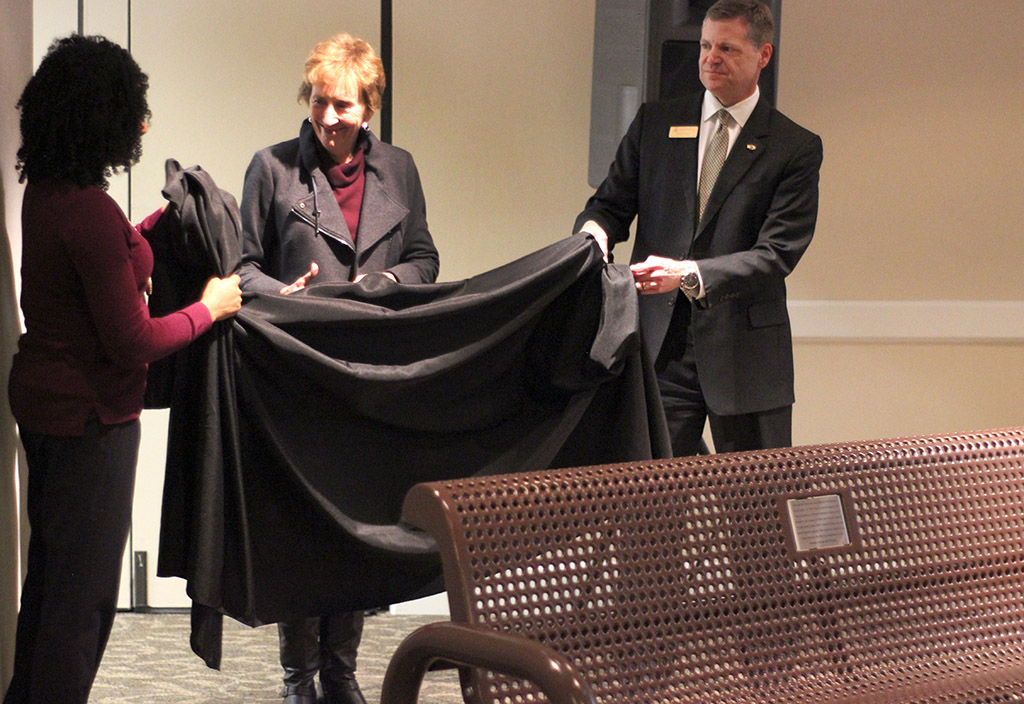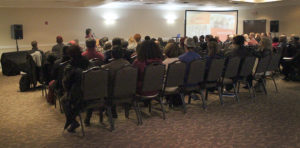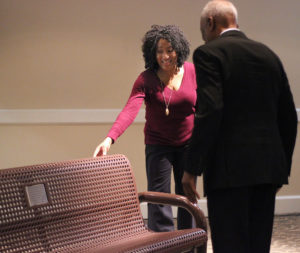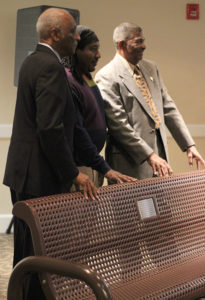Administrators honor first African American students
February 24, 2018

To honor the first African American students who attended MSU in 1954, administrators hosted a ceremony in which they dedicated a bench to the alumni in the Clark Student Center Comanche Suites on Feb 23.
Syreeta Greene, director of the office of equity, inclusion and multicultural affairs, said she felt honored to host the ceremony because she had the opportunity to meet iconic individuals who created a legacy mark.

“To be the person who had to coordinate the event, it’s a mixture of regular, good old stress because you want things to be perfect for folks that have a meaningful contribution to the institution, but also honored to be able to meet living legacies to hear their stories and to know that I did something meaningful,” Greene said.
Suzanne Shipley, university president, said the ceremony helps students understand that it takes individuals to change society and to fight for what they believe in.
“When you look around, you’re not going to see the difficulties and prejudices that people before you had to fight through whether it’s feminism, racism or other ‘isms,'” Shipley said. “It gives you the courage to know that the things you’re fighting now can be changed and can be fought, but it helps you realize that you have to stand up and that’s what they did.”
Keith Lamb, vice president of student affairs and enrollment management, said the ceremony is a chance for students to experience history.
“It’s fascinating. It’s history. We have had the opportunity today to interact with the institution’s history and to learn a lot from it. This predates almost all of us, right? And it is a significant story to be told and needs to live on, and that is certainly pertinent today,” Lamb said.
Charles Bosley, honoree, said history allows students to be aware of the events that happened before them and what’s happening now so they can understand the importance of an education and their futures.
“My parents were farmers and I knew right away that I didn’t want to be a farmer,” Bosley said. “Education is the key and it allows many obstacles. You guys are the future and the future is yours.”

Edwin Fuller, honoree, said being back to visit his hometown of Wichita Falls has changed tremendously.
“The people react to you differently than they did in the old days,” Fuller said. “In the old days, it was separate and unequal so it’s a big change. I spent all of my summers here and there was no work because if you were black, you couldn’t get a job.”
Rosie Flanigan, longtime friend of both honorees, said she attended MSU for her master’s degree. She also said she wanted the community to come out to and bring their children so they could see the history behind the bench.
“Our students have lost so much, and I wish the Wichita Falls community would bring their children out here so that they would know the struggles that people have gone through so that they could afford a good education,” Flanigan said.
O’Linda Battle Barnett, sister of Dorothy Battle, one of the first African American students enrolled on campus, and Willie Faye Battle, one of the plaintiffs on the case, said she’s proud to see her sisters hard work pay off.
“I am very proud of Midwestern University because the fact that I know my sister had a great point in getting Midwestern to be what it is today by applying. She had the strength to come apply and when she was turned down, she didn’t stop. She followed through,” Barnett said. “And as a result, today, Midwestern is multicultural. It has all races at the school, which is tremendous because they are able to work together and bring a lot of different things to the university making it stronger.”
Greene discussed racist policies in the past and how campus culture has changed since.
“For some colleges and universities around the country when integration happened, there was a sundown policy unofficially, where students of color had to be off campus by the time the sun went down,” Greene said. “When you have those types of factors and to think that’s a drastic change to the way students can live on campus and engage on campus is vastly different than what they experienced.”

Barnett said she wants all students to know about the history of their school and to be proud of it.
“This is our history, everyone’s history,” Barnett said. “I want all of the students attending Midwestern to know about this so they can be able to know about their history and be proud and know where they are today and respect their school.”
Additional reporting by Tyler Manning.


